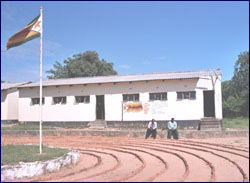15 July 2004
MediaNews 14 - July 2004
‘We are all leaders’ - local governance programme put into practice
Workshop
By Marieke van Twillert
It is a bright morning in Matabeland. At the Nswazi primary school in Umzingwane district the children enter the classrooms that surround the playground with the torn flag. All but one classroom is occupied; the empty one is reserved today for a workshop on Local Governance that is part of ACPDT’s Local Governance Programme.  | | Nswazi primary school |
The African Community Publishing and Development Trust (ACPDT), a Zimbabwean non-profit trust, launched the Local Governance Community Capacity Building Programme, in Zimbabwe in 1997. Apart from Umzingwane, the districts Matobo (Matabeleland) and Gokwe North (Midlands) are places of action. However, ACPDT hopes to expand its activities onto other districts in the future.
The purpose of the Local Governance Programme is to improve the quality of communication and relationships between communities, local authorities and central government, in order to enhance peace building, democracy and good local governance.
Trust
Regina, member of the ACPDT local district training team and the facilitator of today, opens the meeting with a song and prayer. By that time, the 18 participants have entered the classroom, and every pair shares the ACPD workbook ‘The Source from which Rivers Flow – organising for local governance, poverty reduction and development’.
The objective of the first task is ‘Trust Building’. In order to gain trust, all the members within three groups are asked to discuss with each other. They share the news of their village, both positive and negative, and choose a symbol for their group. This will enable the participants to identify their common ground.
Doves
In this case, rain is a common denomination. One group summarizes the joint positive news: "Many rains and subsequently good crops". But the downside is that the showers fell "too dispersed, so some crops have failed".
The groups also share other news. On the negative side they mention that "the police have harassed and arrested squatters, even pregnant women". For positive news, one group adds up: "We share the same background, we have the same culture, we use the same language, we are all black, we are all farmers, and we are all leaders."
Remarkably, all three groups choose – independently - the dove as their symbol. "Because it is a symbol of peace, and we are a people of peace", and: "Let’s unite and build our country and be as doves. A dove represents love, peace and unity."
Power
The Local Governance Programme has a facilitating role. By means of workshops it wants to enlarge the knowledge of village people. ACPDT gives both theoretical and practical workshops. During these workshops the participants discuss matters concerning power and the clashes between the various owners in possession of power.
"People are confused", explained one of the three ACPDT managers Talent Nyathi, "for example during elections. Who holds the power: the chief, the appointed elected or the community?"
"As ACPDT we feel this is the best way in which we can contribute to dealing with the crisis in Zimbabwe", said Kathy Bond-Stewart, ACPDT manager. "Although it is still a week sector, local government is a sector that reaches and affects the daily lives of citizens."
Dam
The workshops in the villages prove to be quite fruitful. "Immediately following the workshop", said village head Leonard Dube from Matobo district, "our village came together with the adjacent village. We held a palaver with 200 people or more to discuss our common problems. As a result, we have built a small dam and a garden."
Fiona Dube, a primary schoolteacher from Matobo reported that the local teachers had met after the workshop. "We concluded that the school pupils lack fruit in their daily diet, so we decided to grow fruit trees. We now have started a nursery of a mango tree orchard."
These are practical examples that the attendants of the workshop brought forward. Moreover, many participants related about their 'new way of thinking’.
The biggest achievement of the local governance programme, according to councillors Elvis Sibanda and Dumisani Mpofu from Umzingwane, is the fact that "traditional leaders and elected leaders have had the opportunity to clarify their different roles and how these relate to each other". Ignorance on the specific structures used "to cause a lot of confusion, especially in the wards".
Courage
"Through the local governance programme we now know our rights", said Chief Simchembu from Gokwe North. "We sometimes challenge them (the elected leaders, ed.), because we are not scared." He gives an example: "I am about to meet the Minister of Local Government, Cde Ignatius Chombo. This is a result of the courage I gained through this organization, ACPDT. They have highlighted to us now that there is no one who-ever who can be feared when we talk in terms of development."
Chief Simchembu unfolded what he will be discussing with Minister Chombo: "As you know the Tonga's were displaced from the Zambezi River up to here. We have got our fellow mates, the Kore Kore people. We want those people to be involved into this programme so that they can identify themselves. As it is now, they are hiding themselves. They have changed to other languages. But they must not hide. If possible, we want their mother language also to be taught at school. Just like any other language. That is our motto." Marieke van Twillert is freelance journalist and MediaNews editor
|

